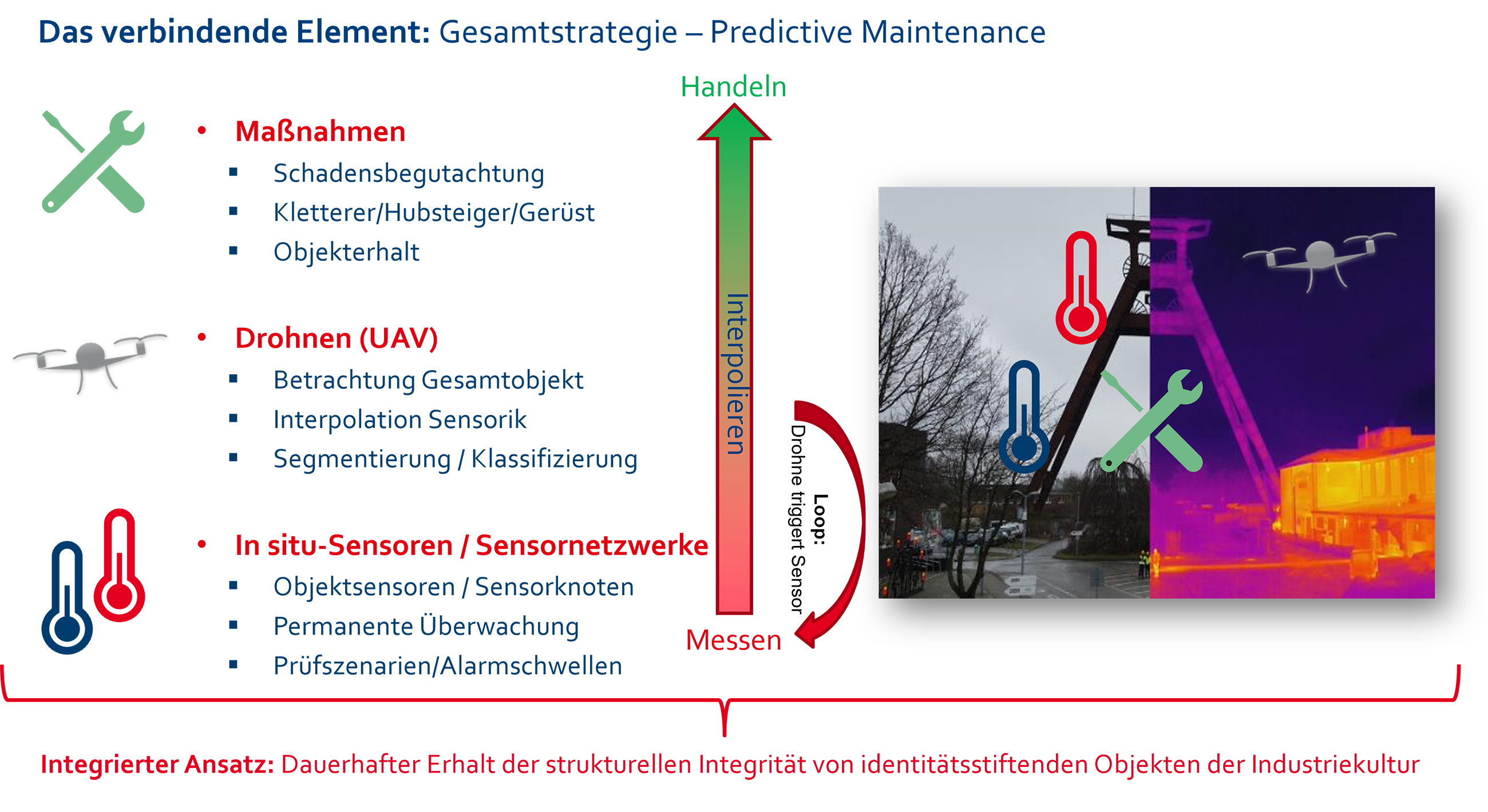KONSENZ: Concept development for sensory condition monitoring of industrial cultural assets
Development of an integrated approach combining sensor networks and drones for condition monitoring of identity-forming industrial heritage sites
The Ruhr region and Saarland are both strongly influenced by their industrial history. Both regions are rich in industrial cultural heritage. Industrial cultural assets are historical and tourist highlights. In addition, they are often monumental witnesses to industrial culture and buildings that shape the identity of their respective regions. Striking examples in the Ruhr region include the UNESCO World Heritage Site Zollverein Coal Mine Industrial Complex in Essen, the Jahrhunderthalle in Bochum, and the Gasometer in Oberhausen; in Saarland, examples include the former Velsen, Itzenplitz, and Camphausen coal mines.
Of course, there are also legal obligations for regular inspections of such architectural monuments, especially since they are the focus of public attention. Predictive maintenance is necessary and sensible for reasons of time and cost efficiency. To this end, it is crucial to assess the condition of the infrastructure, particularly with regard to the structural integrity of the steel objects (support structures). The (early) detection of damage, for example due to corrosion of the structural elements, plays a special role here.
Modern non-destructive approaches using sensor networks for continuous monitoring of structures already provide important information about the effects of dynamic processes during operation in aviation and other industries (keyword: Industry 4.0). Copter-based methods for building monitoring are increasingly being put into practice, for example in the monitoring of hard-to-reach components of bridges.
KONSENZ aims to combine both approaches and apply them to industrial cultural heritage. The combination of different methods aims to achieve the most holistic approach possible for monitoring. Sensors can provide highly accurate and closely timed in situ information at critical points, while drones can use image processing approaches to view the entire object as needed and feed findings back to the sensors in a feedback loop.
The overarching goal of the project is therefore to develop an integrated process for assessing the condition of industrial heritage sites in both regions, combining copter-based remote monitoring with local condition diagnosis using sensor networks.
To this end, the project is divided into two phases, each of which is intended to develop different levels of technical maturity. Phase 1 (project reference number 25-00599), which is now being funded by the RAG Foundation , lays the technological foundations and investigates the general feasibility of the combined approach.
The research project is being carried out jointly by the Fraunhofer Institute for Non-Destructive Testing in Saarbrücken and the THGA's Post-Mining Research Center in Bochum. Both partners are contributing their respective expertise to the project.
Project duration: September 1, 2025 – August 31, 2027

The project “Concept Development for Sensory Condition Monitoring of Industrial Cultural Heritage (KONSENZ)” is financed by funds from the RAG Foundation. Project reference number 25-00599.
Project objectives
- Development of the fundamentals for a holistic predictive maintenance approach to structural monitoring
- Intelligent integration of in situ sensor nodes and remote sensing approaches based on drone data
- Determination of feasibility and production of a demonstrator (TRL 3–4)
Contact

Dr. rer. nat. Bodo Bernsdorf
Technische Hochschule Georg Agricola University
Herner Street 45
44787 Bochum
Building 2, Room 102
Phone 0234 968 4210
Mail bodo.bernsdorf@thga.de



